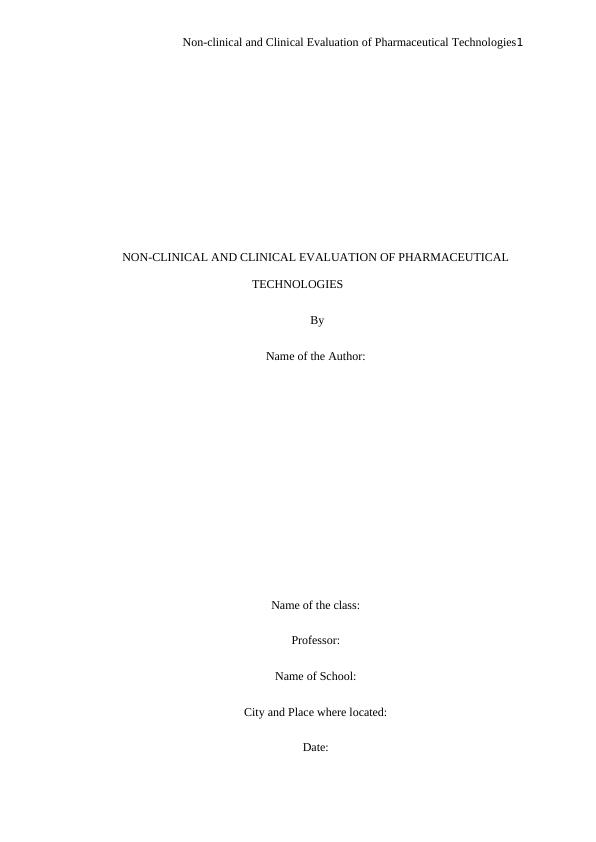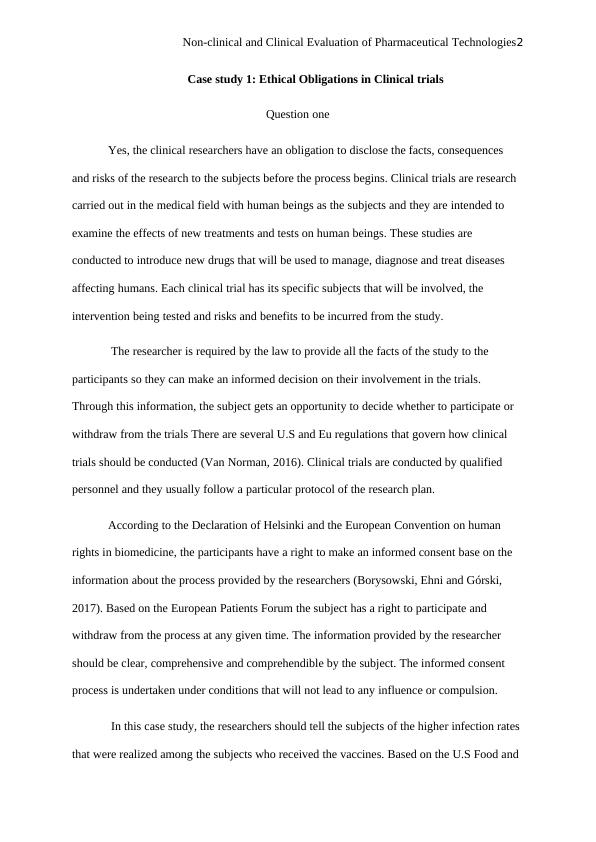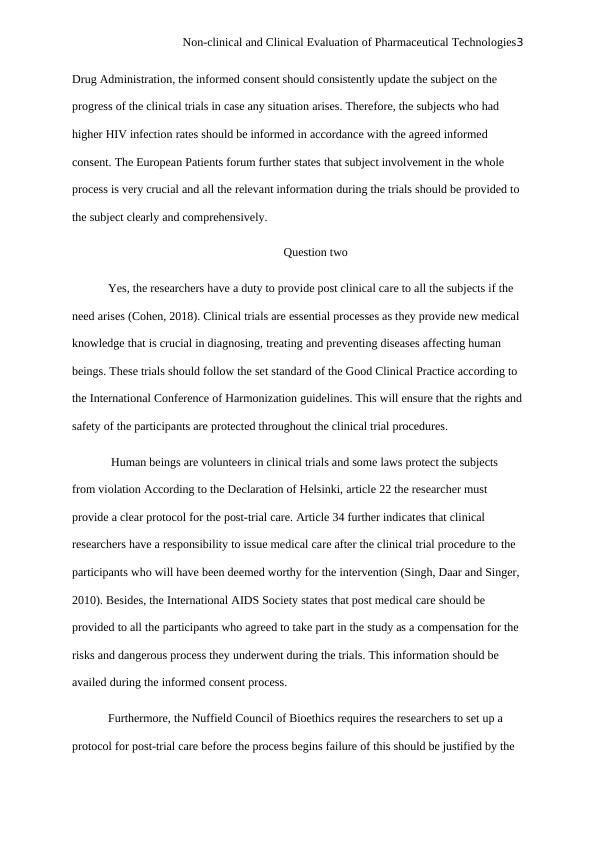Non-clinical and Clinical Evaluation of Pharmaceutical
Added on 2022-09-12
8 Pages2023 Words20 Views
Non-clinical and Clinical Evaluation of Pharmaceutical Technologies1
NON-CLINICAL AND CLINICAL EVALUATION OF PHARMACEUTICAL
TECHNOLOGIES
By
Name of the Author:
Name of the class:
Professor:
Name of School:
City and Place where located:
Date:
NON-CLINICAL AND CLINICAL EVALUATION OF PHARMACEUTICAL
TECHNOLOGIES
By
Name of the Author:
Name of the class:
Professor:
Name of School:
City and Place where located:
Date:

Non-clinical and Clinical Evaluation of Pharmaceutical Technologies2
Case study 1: Ethical Obligations in Clinical trials
Question one
Yes, the clinical researchers have an obligation to disclose the facts, consequences
and risks of the research to the subjects before the process begins. Clinical trials are research
carried out in the medical field with human beings as the subjects and they are intended to
examine the effects of new treatments and tests on human beings. These studies are
conducted to introduce new drugs that will be used to manage, diagnose and treat diseases
affecting humans. Each clinical trial has its specific subjects that will be involved, the
intervention being tested and risks and benefits to be incurred from the study.
The researcher is required by the law to provide all the facts of the study to the
participants so they can make an informed decision on their involvement in the trials.
Through this information, the subject gets an opportunity to decide whether to participate or
withdraw from the trials There are several U.S and Eu regulations that govern how clinical
trials should be conducted (Van Norman, 2016). Clinical trials are conducted by qualified
personnel and they usually follow a particular protocol of the research plan.
According to the Declaration of Helsinki and the European Convention on human
rights in biomedicine, the participants have a right to make an informed consent base on the
information about the process provided by the researchers (Borysowski, Ehni and Górski,
2017). Based on the European Patients Forum the subject has a right to participate and
withdraw from the process at any given time. The information provided by the researcher
should be clear, comprehensive and comprehendible by the subject. The informed consent
process is undertaken under conditions that will not lead to any influence or compulsion.
In this case study, the researchers should tell the subjects of the higher infection rates
that were realized among the subjects who received the vaccines. Based on the U.S Food and
Case study 1: Ethical Obligations in Clinical trials
Question one
Yes, the clinical researchers have an obligation to disclose the facts, consequences
and risks of the research to the subjects before the process begins. Clinical trials are research
carried out in the medical field with human beings as the subjects and they are intended to
examine the effects of new treatments and tests on human beings. These studies are
conducted to introduce new drugs that will be used to manage, diagnose and treat diseases
affecting humans. Each clinical trial has its specific subjects that will be involved, the
intervention being tested and risks and benefits to be incurred from the study.
The researcher is required by the law to provide all the facts of the study to the
participants so they can make an informed decision on their involvement in the trials.
Through this information, the subject gets an opportunity to decide whether to participate or
withdraw from the trials There are several U.S and Eu regulations that govern how clinical
trials should be conducted (Van Norman, 2016). Clinical trials are conducted by qualified
personnel and they usually follow a particular protocol of the research plan.
According to the Declaration of Helsinki and the European Convention on human
rights in biomedicine, the participants have a right to make an informed consent base on the
information about the process provided by the researchers (Borysowski, Ehni and Górski,
2017). Based on the European Patients Forum the subject has a right to participate and
withdraw from the process at any given time. The information provided by the researcher
should be clear, comprehensive and comprehendible by the subject. The informed consent
process is undertaken under conditions that will not lead to any influence or compulsion.
In this case study, the researchers should tell the subjects of the higher infection rates
that were realized among the subjects who received the vaccines. Based on the U.S Food and

Non-clinical and Clinical Evaluation of Pharmaceutical Technologies3
Drug Administration, the informed consent should consistently update the subject on the
progress of the clinical trials in case any situation arises. Therefore, the subjects who had
higher HIV infection rates should be informed in accordance with the agreed informed
consent. The European Patients forum further states that subject involvement in the whole
process is very crucial and all the relevant information during the trials should be provided to
the subject clearly and comprehensively.
Question two
Yes, the researchers have a duty to provide post clinical care to all the subjects if the
need arises (Cohen, 2018). Clinical trials are essential processes as they provide new medical
knowledge that is crucial in diagnosing, treating and preventing diseases affecting human
beings. These trials should follow the set standard of the Good Clinical Practice according to
the International Conference of Harmonization guidelines. This will ensure that the rights and
safety of the participants are protected throughout the clinical trial procedures.
Human beings are volunteers in clinical trials and some laws protect the subjects
from violation According to the Declaration of Helsinki, article 22 the researcher must
provide a clear protocol for the post-trial care. Article 34 further indicates that clinical
researchers have a responsibility to issue medical care after the clinical trial procedure to the
participants who will have been deemed worthy for the intervention (Singh, Daar and Singer,
2010). Besides, the International AIDS Society states that post medical care should be
provided to all the participants who agreed to take part in the study as a compensation for the
risks and dangerous process they underwent during the trials. This information should be
availed during the informed consent process.
Furthermore, the Nuffield Council of Bioethics requires the researchers to set up a
protocol for post-trial care before the process begins failure of this should be justified by the
Drug Administration, the informed consent should consistently update the subject on the
progress of the clinical trials in case any situation arises. Therefore, the subjects who had
higher HIV infection rates should be informed in accordance with the agreed informed
consent. The European Patients forum further states that subject involvement in the whole
process is very crucial and all the relevant information during the trials should be provided to
the subject clearly and comprehensively.
Question two
Yes, the researchers have a duty to provide post clinical care to all the subjects if the
need arises (Cohen, 2018). Clinical trials are essential processes as they provide new medical
knowledge that is crucial in diagnosing, treating and preventing diseases affecting human
beings. These trials should follow the set standard of the Good Clinical Practice according to
the International Conference of Harmonization guidelines. This will ensure that the rights and
safety of the participants are protected throughout the clinical trial procedures.
Human beings are volunteers in clinical trials and some laws protect the subjects
from violation According to the Declaration of Helsinki, article 22 the researcher must
provide a clear protocol for the post-trial care. Article 34 further indicates that clinical
researchers have a responsibility to issue medical care after the clinical trial procedure to the
participants who will have been deemed worthy for the intervention (Singh, Daar and Singer,
2010). Besides, the International AIDS Society states that post medical care should be
provided to all the participants who agreed to take part in the study as a compensation for the
risks and dangerous process they underwent during the trials. This information should be
availed during the informed consent process.
Furthermore, the Nuffield Council of Bioethics requires the researchers to set up a
protocol for post-trial care before the process begins failure of this should be justified by the

End of preview
Want to access all the pages? Upload your documents or become a member.
Related Documents
Informed Consent in Clinical Researchlg...
|5
|1229
|180
Clinical Trial Assessmentlg...
|13
|3146
|79
Ethics of Clinical Trialslg...
|9
|2813
|182
Clinical Research: Participant Information Sheet, Consent Form, and Procedureslg...
|15
|2416
|496
Clinical Trial Misconductlg...
|5
|1110
|54
Study Design in Clinical Research Reportlg...
|11
|2417
|18
